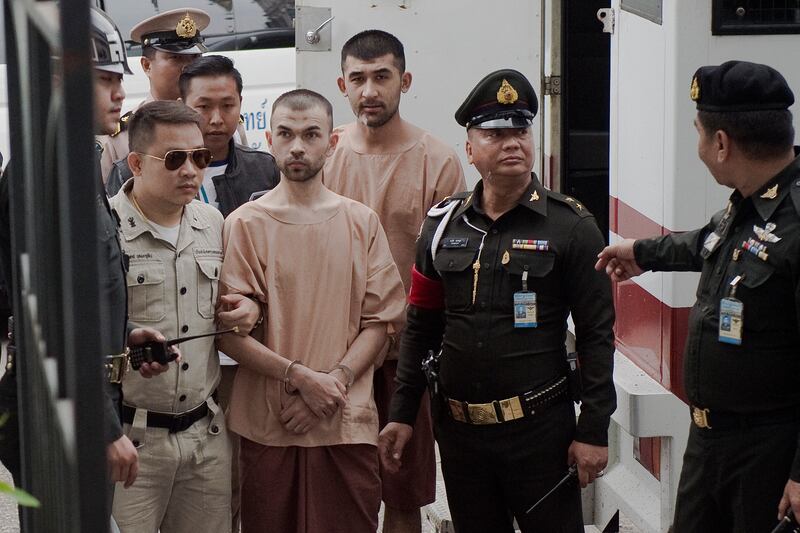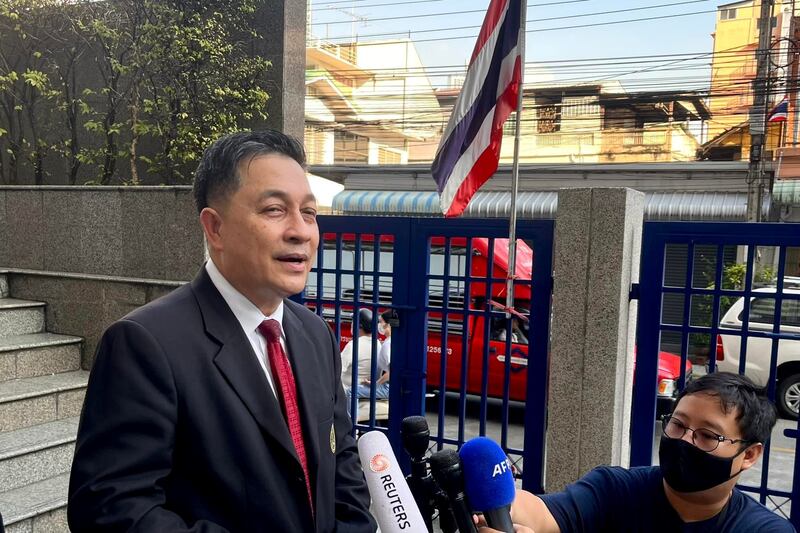Two Uyghurs charged with detonating a deadly bomb at a popular Hindu shrine in Bangkok seven years ago heard testimony against them in a civilian court Tuesday for the first time in their trial after a series of delays.
Adem Karadag (alias Bilal Mohammed) and Yusufu Mieraili have seen their death penalty case disrupted over concerns about the quality of the courtroom translation and as a result of the COVID-19 pandemic. The case began in a military court before being transferred to a civilian one after former junta chief Prayuth Chan-o-cha was elected prime minister in 2019.
On Tuesday, a member of the Explosive Ordnance Disposal (EOD) unit and two police forensic officers took the stand. They testified that two bombs exploded at the Erawan Shrine – a deadly blast on Aug. 17, 2015, followed by a non-lethal one the next day.
“As we searched their apartments, we found two types of items – personal items and materials that could make explosives, namely Urea, black powder and flash powder,” said police Lt. Gen. Kamthorn Uncharoen, who served as chief of the bomb squad at the time of the explosion.
Karadag and Mieraili are charged with setting off a home-made bomb that killed 20 people and injured more than 100 at the shrine on Aug. 17, 2015. The men could face death sentences if convicted of the charges, which include premeditated killing and possession of explosives.
Defense lawyer Chuchart Kanpai challenged the admissibility of the evidence, saying the military, not the police, were the first to reach the scene.
“The door was broken in and the haul was laid on the floor before the police arrived,” he said.
Authorities believe the explosion could have been in retaliation for the Thai government's deportation of about 100 Uyghurs to face possible execution in China about a month earlier, according to a government official who asked for anonymity because he was not authorized to speak to reporters.
The deportations came about a week after 173 Uyghurs , mostly women and children, were sent from Bangkok to Turkey. Those two groups sought to escape persecution in Xinjiang by traveling to Thailand in 2014, a Uyghur activist told Radio Free Asia, a news service affiliated with BenarNews, at that time.

Defense complaints
On Tuesday, the Uyghurs’ legal team complained about the court-appointed interpreter.
Chuchart Kanpai, the lawyer representing Karadag, said he told the judge that the translator used his cell phone to take photos and record testimony, which is prohibited.
An advocate for the defendants also questioned the accuracy of the Chinese government-delegated translator.
“The Chinese translator is not professional,” Chalida Tajaroensuk, director of the People’s Empowerment Foundation, a Thai NGO that helps Uyghur migrants, told BenarNews. “He cannot translate legal terms accurately.”
Previously, Chalida and a lawyer had said that Karadag could not speak Chinese and would prefer a Uyghur-speaking translator while Mieraili could communicate in English, but not fluently.
Karadag and Mieraili arrived at the Southern Bangkok Court on Tuesday wearing brown prison uniforms, but refused to be photographed. They have been remanded at the military’s Lak Si temporary detention center since their arrests within two weeks of the August 2015 bombing.
“I want to ask the court to transfer us to [a] regular prison. I talked to Department of Corrections officials, I learned they have a better vibe in their prison,” Mieraili told BenarNews outside the court.
While the pandemic has been blamed for trial delays, both men have received vaccines and neither has tested positive for the coronavirus.
Mieraili said that concerns about food that they had raised during a hearing in January 2022 had not been addressed. They were in court 10 months ago for a hearing to schedule trial dates – their first appearance since they pleaded not guilty to the charges in January 2020.
"We cannot choose halal foods . Sometimes, we had pork, sometimes chicken, no halal," he said in Thai and English. "But sometimes we had fish, which is already halal."
Chuchart said the trial could take years to finish.
“We don’t know when the trial will be done. There are over 700 prosecutor’s witnesses and that was cut down to over 200 but I cannot confirm that number,” he told BenarNews.
Lawyer Jamroen Panonpakakorn, who represents Mieraili, said the defendants planned to call only five to 10 witnesses. The court scheduled sessions through Nov. 25 and from Dec. 6 to 9.

Other Uyghurs in limbo
Karadag and Mieraili have identified themselves as Uyghurs from Urumqi in the Xinjiang Uyghur Autonomous Region (XUAR) in China.
As many as 52 to 56 Uyghurs from the region have been in limbo in Thailand after they allegedly entered the country while fleeing from northwestern China seven to eight years ago, Chalida said earlier this year
At least 44 of them are at Suan Plu immigration detention center, but it was not clear what happened to the others.
Thai officials said the Uyghurs who fled from XUAR were detained as they tried to travel through Thailand to seek asylum in Turkey or other countries.
The exodus began in 2013 and 2014 when about 475 fled to Thailand. Since then, other Uyghurs have entered the country in a series of smaller waves.
Rights activists have said human smuggling rings allegedly aided Uyghurs in entering Thailand from Myanmar and Laos. The asylum seekers traveled by roads and sometimes trekked through jungles to avoid police checkpoints along the way to Malaysia, but most ended up being rounded up in the far southern province of Songkhla, near the Malaysian border.

